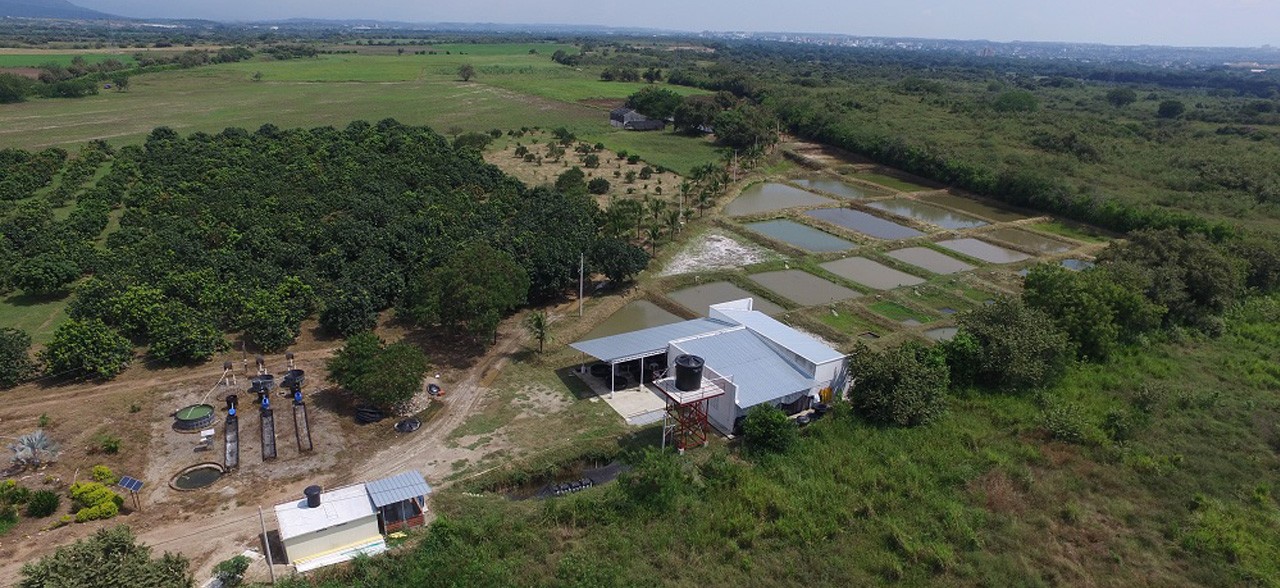- It is the Surcolombiana Experimental Station of Hydrobiological Resources (ESRH, for the Spanish original), which was built by Enel-Emgesa and Universidad Surcolombiana (USCO, for the Spanish original) and aims to study, research, learn and restock native fish species of the Magdalena River.
- The certification issued by the ICA emphasizes that the sanitary standards of this fish farm are optimal and meet the highest health standards for restocking.
The Surcolombiana Experimental Station of Hydrobiological Resources (ESRH), built and started up more than a year ago by Enel-Emgesa and the USCO in the municipality of Palermo (Huila), became the first and only fish farm in Colombia to be certified by the Colombian Agricultural Institute (ICA, for the Spanish original) for being considered a biosecure site and meeting the highest health standards. On the farm, native fish species from the Magdalena River are being produced, some of which are endangered, and can be used for the development of restocking programs in the river and the Betania and El Quimbo reservoirs.
The importance of this certification lies in the fact that, through compliance with sanitary standards, the presence of diseases is prevented and controlled, thus ensuring that the fish to be used to restock the reservoirs do not pose a sanitary risk. This will allow their survival in the natural environment. Also, in addition to the environmental impacts, this restocking of fish, which will take place in the next few years, will have major social benefits for the department of Huila in line with the social objective to preserve artisanal fishing activity in the region.
This certification is one of the requirements of the National Aquaculture and Fishing Authority (AUNAP, for the Spanish original) to grant the authorization for Enel-Emgesa and the USCO to restock the Betania and El Quimbo reservoirs. This certification will be submitted to the authority along with the other requirements in order to begin restocking in the first quarter of 2019, by introducing more than two million fry (offspring) of species such as capaz, dorada, bocachico, peje and pataló.
Furthermore, through this certification, the Surcolombiana Experimental Station of Hydrobiological Resources continues to position itself as an academic and scientific benchmark, and as a research center focused on topics related to the reproductive biology of native fish species. To date, three undergraduate theses, three master’s theses and one doctoral thesis have been carried out at the site, on topics such as hematology and blood chemistry in breeding stock, the use of anesthetics and their effect on stress-related blood parameters, larviculture and the use of algae as a potential source of biodiesel.
ABOUT THE SURCOLOMBIANA EXPERIMENTAL STATION OF HYDROBIOLOGICAL RESOURCES:
The ESRH is the first fish farming station in the country to carry out research and induced reproduction of endangered native species of the Magdalena River. Its construction took place as part of the Upper Magdalena Fish and Fishing Program being implemented by Enel-Emgesa for six years now and in which it has invested more than COP 15,000 million. The station has 34 earthen ponds that amount to 7,300 m2 of water surface and an infrastructure of 400 m2, which includes: fish reproduction areas, mass production of live food, incubation, larviculture and experimental laboratories.
This station, which is located in the municipality of Palermo, Huila, has received more than 400 visitors from neighboring communities of the Betania and El Quimbo reservoirs, as well as from universities in the region. In addition, with 30 artisanal fishermen from the central region of the department, courses have been carried out focused on the artificial reproduction of fish and the production of small fry (offspring) of endangered species in the state of preservation.
ABOUT THE ENEL GROUP: ENEL-CODENSA AND ENEL-EMGESA
Enel-Codensa and Enel-Emgesa are part of the Enel Group, a multinational energy company and one of the main global integrated operators in the electricity and gas sector. The Group is operating in 34 countries on the 5 continents, generating energy through a managed capacity of approximately 88 GW. Enel distributes electricity and gas through a network of more than 2 million kilometers, and with nearly 72 million residential and corporate customers around the world.
Enel-Emgesa is a company involved in the business of generating and selling electricity in Colombia, with nearly 465 customers on the non-regulated market and a total installed generation capacity of 3,504 MW. It has 15 hydroelectric power plants and two thermal power plants operating in the departments of Cundinamarca, Bolívar and Huila. Since 2013, it has played a role as a natural gas vendor in negotiation processes with producers, resellers and customers from the Non-regulated Market. The generator and reseller of electric energy is still Emgesa S.A. ESP, an entity overseen by the Superintendence of Residential Public Services.

